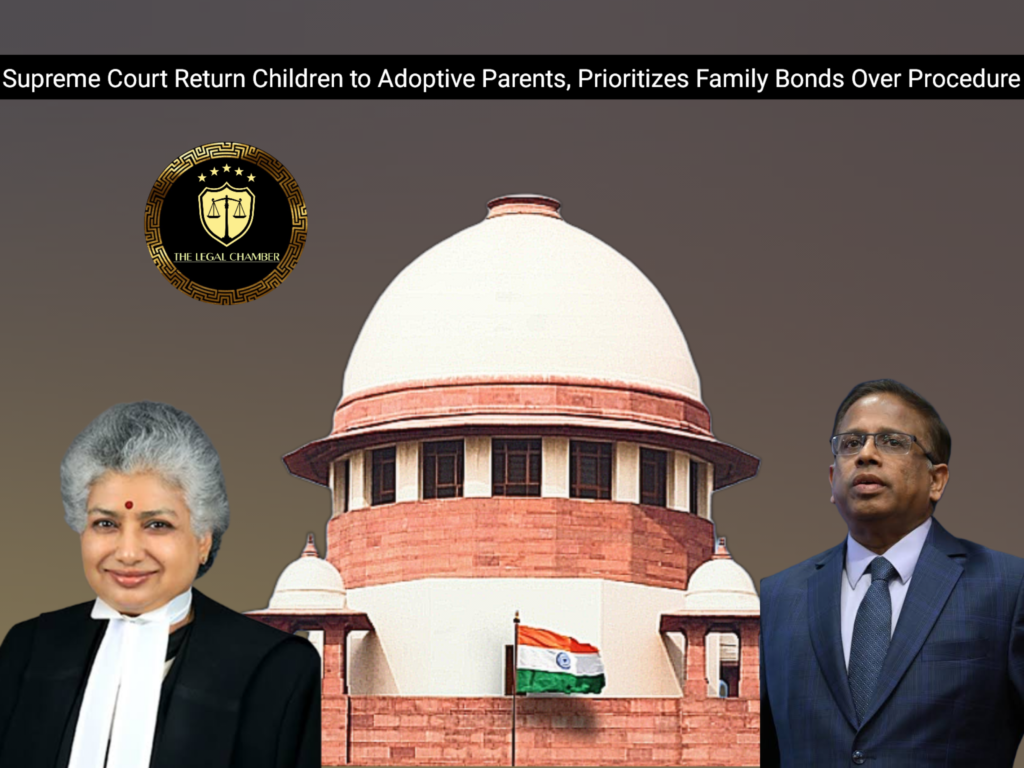
The Supreme Court ruled that removing children from their adoptive parents violated the principle of the child’s best interest, a cornerstone of juvenile justice law. Invoking Article 142 to ensure complete justice, the Court ordered the children’s immediate return, prioritizing family bonds and rehabilitation over procedural non-compliance in adoption.
Facts Of The Case:
In a series of connected cases, multiple sets of appellants from Andhra Pradesh and Telangana claimed to be the adoptive parents of minor girls. They had adopted the children, ranging from two days to twenty days old, directly from the biological parents between 2021 and early 2024 under the provisions of the Hindu Adoptions and Maintenance Act, 1956. However, on May 22, 2024, police authorities forcibly took custody of all these children from their adoptive families based on a First Information Report and handed them over to the Child Welfare Committee. The adoptive parents challenged this action in the High Court. A Single Judge ruled in their favour, declaring the police action illegal and stating the Juvenile Justice Act did not apply. On appeal, a Division Bench of the High Court reversed this decision, refusing to return the children due to non-compliance with the procedures of the Juvenile Justice Act and directing the Committee to process the cases. The aggrieved adoptive parents then appealed to the Supreme Court, arguing the seizure was without legal authority.
Procedural History:
Court Observation:
The Court observed that the police action of removing the children from their adoptive homes, while based on procedural irregularities in the adoption process, fundamentally disregarded the paramount principle of the child’s best interest as mandated by the Juvenile Justice Act. It emphasized that the general principles under Section 3 of the Act, including family responsibility, safety, positive measures, and institutionalization as a last resort, must guide all decisions. The Bench noted the strong emotional bonding that had developed between the children and their adoptive parents over a significant period. Consequently, it invoked its extraordinary power under Article 142 of the Constitution to do complete justice, prioritizing the children’s welfare, psychological well-being, and right to a stable family environment over strict procedural compliance.
Final Decision & Judgement:
The Supreme Court allowed the appeals and set aside the impugned judgment of the Division Bench of the High Court. The final decision directed the respondent authorities to hand over the custody of all the children to their respective adoptive parents by a specified date. This ruling was expressly founded on the paramount consideration of the child’s best interest, as enshrined in the Juvenile Justice Act. To safeguard the children’s welfare, the Court mandated quarterly monitoring of their progress by the legal services authorities. Crucially, the Court clarified that this unique relief was granted by invoking its extraordinary powers under Article 142 of the Constitution to ensure complete justice in the peculiar facts of the case.
Case Details:
Case Title: Dasari Anil Kumar & Anr. vs. The Child Welfare Project Director & Ors. Citation: 2025 INSC 972 Appeal Number: (Arising from Petition for Special Leave to Appeal (C) No. 6322 of 2025) along with other connected SLPs. Date of Judgement: August 12, 2025 Judges/Justice Name: Justice B.V. Nagarathna and Justice K.V. Viswanathan
Download The Judgement Here